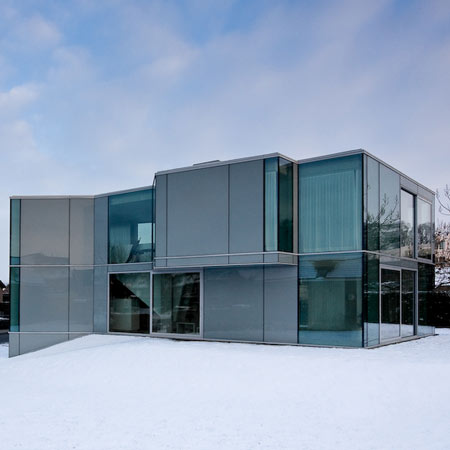Architectural photographer Joao Morgado has sent us some images of a house made of glass in Maastricht, Netherlands, designed by Wiel Arets Architects.
Called H House, all the internal and external walls are a combination of transparent and opaque glass, however a series of curtains on the interior provide privacy.
The building has no structural walls, with a few rectangular columns providing support.
The house is situated with a formal garden behind the building, which is occasionally open to the public.
Photographs are by Joao Morgado.
Here's some more information from the architects:
Wiel Arets Architects
The H House (Completed)
Maastricht, the Netherlands 2005 - 2009
Made for a couple, the H-House is located in a leafy area of Maastricht. The clients are a dancer and an actor, as well as landscape architects. Behind the site is a formal garden, which is occasionally open to the public.
The interior of the home is primarily a single loft-like space with a central mezzanine. Two smaller independent volumes - the entrance and bathroom - are adjacent to this main volume. Terraces define the position and shape of the house, with each terrace having its own separate character.
Having no structural walls, only a few rectangular columns support the house's slabs, which have been positioned to minimize impact. All other walls, whether internal or external, consist of glass. The house's stair is an independent object within this loft-like setting. The required range of privacy, as desired by the owners, can be controlled with a series of curtains that can be drawn to softly define the interior spaces.
The combination of transparent and opaque glass, as well as the sliding and fixed portion of the façade, creates a number of different possible responses to the changing of the seasons and the fading of daylight. The spaces of the house are suffused with richness due to the layering of this unadorned configuration, the combination of materials and the variations in use.
See also:
.
| Wiel Arets for Alessi |
Long Island House by Kanner Architects |
More architecture stories on Dezeen |

